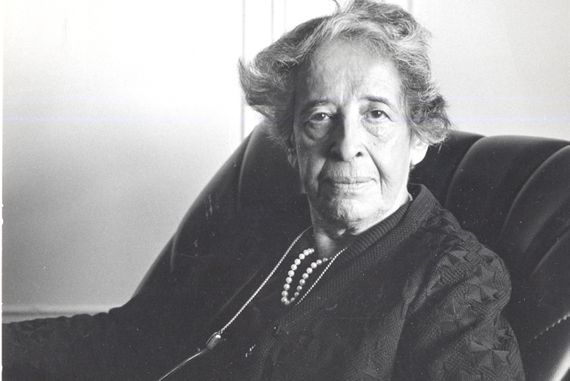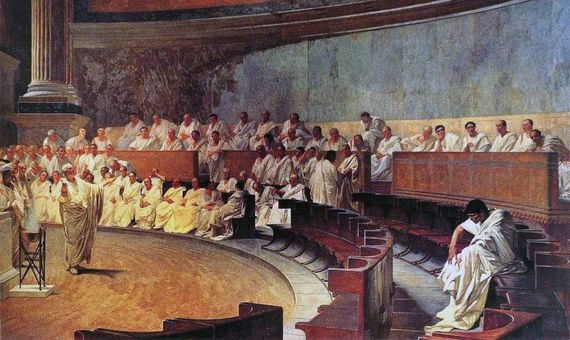Questioning the concept of freedom implies understanding the contradiction between our consciousness on the one hand –that is, our conscious self–, and our everyday experience on the other. The first tells us we are free and responsible, while our everyday experience, in which we deal with the world on a daily basis, shows us we are ruled by the principle of causality. Although in the sphere of politics and in more practical matters we assume human freedom to be a given, and –based on this assumption– laws are agreed and opinions adopted and applied to social groups, the idea prevailing in the theoretical and scientific sphere is that in the end our lives are guided by causality. This is because, due to the multiple elements involved in our actions, we are ultimately unable to know all the possible causes that come into play, and because human motivation is impossible to predict.
Causality and freedom in philosophy and politics throughout history
For authors like Hannah Arendt, causality, both in nature and in the universe, is a mental category that allows us to order the data perceived by the senses, thereby making experience possible. In other words, in the instant we think and reflect on an action that was carried out in the belief that our “self” was a free agent, then that act can be seen to fall within the realm of causality. And not only the causality that derives from the individual’s internal motivations, but the causality that rules the outside world.

In the area of political theory, the question of freedom is unavoidable. From the political standpoint, freedom requires a guaranteed public arena to be able to make its appearance; it needs a space in the world.
This idea of political freedom as “potential” political freedom has played a very important role throughout history and in the development of political thought. In the 17th and 18th centuries, it was commonly held that political freedom could be identified with security. The main purpose of the government was to guarantee security, and this security gave rise to freedom, a freedom that implied a series of actions that took place outside the political arena.
The birth of political and social science widened the abyss between freedom and policy, when the government began to see itself as the guarantor of the life process and of the interests of men and women and their societies. The criterion of security persisted, but it was no longer understood as it had been in the past, rather as a security that led to the continuous development of society’s life process. So freedom was more like a kind of stream that flowed without impediments.
Philosophers began to concern themselves with the problem of freedom at the precise time when freedom encroached on the area of free will and the relation with the self –when freedom became free will and ceased to be linked simply to doing, and to relations with others. So the ideal of freedom no longer referred to virtuosity but to sovereignty, and was capable of prevailing over other ideals. From the political point of view, this identification of sovereignty with freedom poses a danger to the philosophical premise that equates freedom with free will, as it involves either the negation of human freedom (men and women are never sovereign), or else the fact that the freedom of an individual or group of individuals can only be achieved at the cost of the freedom of others.
But in human conditions –which are determined by the fact that human beings live in the world–, freedom and sovereignty are not identical, and when individuals wish to be free, they must renounce sovereignty. In antiquity, freedom was experienced through action. Freedom in Rome was a legacy bestowed by the founders of the polis on the Roman people. For them, being free and starting or initiating something were related concepts: their freedom was linked to the beginning marked by their ancestors in founding the city of Rome.
Authority: the legacy of ancient Rome
But we should not overlook the fact that human beings themselves carry out actions; they are individuals who have been born with the “gifts” of freedom and action, and are therefore capable in some way of shaping the reality around them.

The question of authority has also been widely debated. The concept of authority as a unique and decisive feature of human communities did not always exist. Both the concept and the term itself have their origins in Rome, and derive from both the sphere of public policy and from private and family life. In principle, the concept of authority appears to refer to obedience, so it tends to be confused with certain forms of violence or power. However, force or extreme coercion is only used when authority fails, and persuasion precludes authority, given that it applies a process of argumentation. It seems that authority gave the world the stability necessary to allow men and women –as unstable and mortal beings– to feel a certain degree of security. However, the loss of worldly stability does not necessarily imply another loss, such as the capacity enjoyed by human beings to build, care for and preserve their world, their universe, in order to safeguard it as a place where future generations can live.
Dr. Ana González Menéndez
References
-
Arendt, H. (2018): The freedom to be free. Barcelona. Taurus. Penguin Random House Grupo Editorial.
-
Plato (contemporary edition from 2009; original date of publication 380 B.C.): The Republic. Madrid. Akal.
-
Rawls, J. (1971): A Theory of Justice. Oxford. Clarendon Press.
-
Sen, A. (2000): Development as freedom. Barcelona. Editorial Planeta.
-
Stuart Mill, J. (1970; original date of publication 1859): On liberty. Madrid. Alianza Editorial.
Comments on this publication